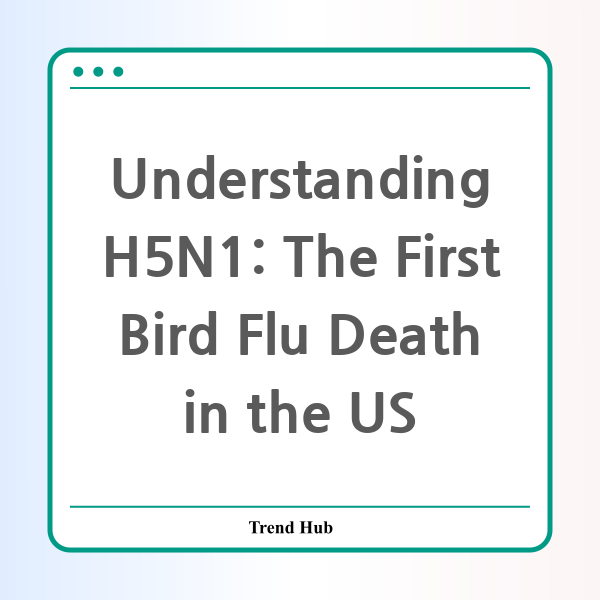* This website participates in the Amazon Affiliate Program and earns from qualifying purchases.

As we move into 2025, public health officials are raising alarms regarding the first reported death from the H5N1 bird flu in the United States. This significant case highlights the potential dangers of avian influenza and its impact on human health. So, what do we need to know about H5N1 and how can we protect ourselves?
On January 6, 2025, the Louisiana Department of Health confirmed the tragic passing of a patient over the age of 65, who succumbed to severe respiratory illness related to the H5N1 virus. This individual had underlying medical conditions and had been exposed to a non-commercial backyard flock and wild birds, which are primary carriers of avian influenza.
The Centers for Disease Control and Prevention (CDC) began monitoring this case last month when the patient first showed symptoms of severe bird flu infection, prompting immediate public health investigations. Thankfully, state health officials have reported no other human cases of H5N1 in Louisiana nor any evidence of person-to-person transmission, which is a relief for the local community.
But what exactly is H5N1? The H5N1 virus is a highly pathogenic strain of avian influenza that primarily affects birds but can also infect humans. The current outbreak began in the U.S. back in April, raising significant concerns among health officials. While the risk to the general public remains low, it is crucial to understand how to minimize exposure to this virus.
Protecting Yourself Against H5N1
Health officials emphasize the importance of avoiding exposure to the virus. Here are critical safety measures:
- Avoid Direct Contact: Stay away from sick or dead birds and the droppings of infected animals. Minimize recreational exposure to wild birds.
- Keep Pets Away: Ensure your pets do not interact with sick or dead animals.
- Safe Food Preparation: Cook poultry, eggs, and other animal products to safe temperatures to prevent foodborne illnesses and cross-contamination. Avoid consuming undercooked food.
- Vaccination Awareness: If you work with poultry or dairy, discuss flu vaccination with your healthcare provider. While it won't prevent H5N1, it can reduce the risk of coinfection.
- Report Illness: If you observe sick or dead birds, report them to the USDA or local agricultural departments immediately.
- Seek Medical Attention: If you have been exposed to infected animals and develop symptoms, seek medical care promptly.
This unfortunate incident underlines the necessity for ongoing public awareness and education on avian influenza. As birds migrate and interact with local environments, the potential for outbreaks exists. Consequently, staying informed and prepared is vital to ensure both personal and public health.
In conclusion, while the recent bird flu death in Louisiana is a serious reminder of the risks associated with H5N1, the overall public health risk remains low. By taking precautionary measures, we can protect ourselves and our communities. Stay vigilant, informed, and proactive in safeguarding your health against potential avian influenza threats.
For continued updates and health alerts regarding H5N1 and other infectious diseases, make sure to keep an eye on official health department communications.
* This website participates in the Amazon Affiliate Program and earns from qualifying purchases.